|
Pharoahs and Freeways
- Cairo, Egypt
As we leave for India in two days, we wanted to
write about Egypt because we don't know really when
we
will next write and how often we will find email.
Plus, the internet cafe in Cairo is air conditioned!
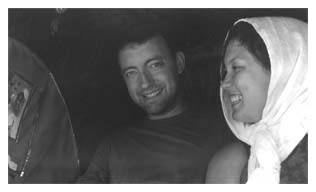
Ah, Egypt ... so strange, so foreign, so @!%*# HOT!
There was much to get used to. First and foremost,
staying alive while crossing the streets. Here, real
life Frogger is played out every time one ventures
across the streets. There are no lane dividers, so
cars
create four lanes where there is room for two. To
cross
you throw yourself into traffic and try to make your
self as thin as possible, then dart across a few more
'lanes' then stand, as another car comes bearing down
on you honking. They rarely obey street signals, and total chaos is
averted only through a complex vocabulary of honking.
Brakes are for sissies, real men use horns.
Many quick beeps, furiously : Get out of my way, or I
will run you over.
One long beeeeeeeeeep: I do not have enough speed to
run you down, but if you don't get out of my way, I
will run over you slowly.
One long beeeeeeeeeep on a two lane road: means you are travelling slower than the
speed of sound, and I will drive 3inches from your
bumper til you let me pass.
Beep,
Beeeeeeeeep: On a two lane street at night, I
am
coming around the corner in your lane, I can't see you and I am
not stopping, so watch out!
Really, the drivers here are horrendous. Perhaps to
conserve fuel or something, many try to drive at
night
with their headlights off as much as possible! Oh,
the
public buses. Continually trying to set a record for the most people in one vehicle, the buses never
stop. To get on, you run alongside and grab the rail by the
back door and pull yourself on. The back door is
always
ripped off and left open to facilitate this practice.
To get off, same thing, avoid the people jumping on,
look both ways, and throw yourself into traffic, as
the
buses don't drive near the curb.
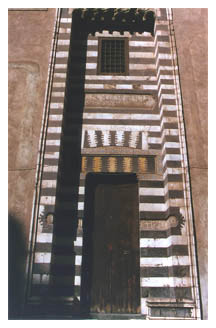 Once used to
manuvuering Egypt, then we we learned
about baksheesh, the black market economy. Baksheesh
is supposed to be tipping for service, but here more
than anywhere else, baksheesh is expected for
EVERYTHING, and many people live on it alone. And its
not just the tourists who are expected. Egyptians
must
baksheesh to get the better cuts of meat or fresher
fruits, better handling of their packages at the post
office, etc. Its a way of life, but it can become
extremely IRRITATING! Here in Cairo, there are many
beautiful mosques. Upon paying to enter a mosque, we
must baksheesh the guy who stands over our shoes.
Then, when we go in, another man rushes over, points
out something utterly useless, then puts his hand out
for baksheesh. If he doesn't think its enough, he will
keeping whining and hanging on, until you surrender more, or run screaming out of the mosque. Sometimes,
they will lock things that are supposed to be open,
just so you will pay baksheesh to see it. Other
times,
they will let you crawl all over antiquities and do
other things you shouldn't, just for baksheesh. In
Luxor, at the famous Kings Tombs, the light is dimmed
and no flashes are allowed and you cant touch
anything
for fear of damaging the paintings. Well, the tomb
guard, will look the other way for a little baksheesh.
Sometimes, after paying for the ticket, they turn off
the lights, and wont turn them on til you baksheesh.
The pharonic monuments are even worse. Walking
around an incredible monument, they run over to you
and latch on like a leech.
It is one horrible aspect of Egypt and it can ruin
your experience, until we learned to play the game.
We hoard tons of small bills, and carry them
separate
from our money (because if they see you have more,
then
they will demand more) so if we get caught in the web,
we can get away cheaply. But more often than not, we
just run the other way, or hide behind a column. Once used to
manuvuering Egypt, then we we learned
about baksheesh, the black market economy. Baksheesh
is supposed to be tipping for service, but here more
than anywhere else, baksheesh is expected for
EVERYTHING, and many people live on it alone. And its
not just the tourists who are expected. Egyptians
must
baksheesh to get the better cuts of meat or fresher
fruits, better handling of their packages at the post
office, etc. Its a way of life, but it can become
extremely IRRITATING! Here in Cairo, there are many
beautiful mosques. Upon paying to enter a mosque, we
must baksheesh the guy who stands over our shoes.
Then, when we go in, another man rushes over, points
out something utterly useless, then puts his hand out
for baksheesh. If he doesn't think its enough, he will
keeping whining and hanging on, until you surrender more, or run screaming out of the mosque. Sometimes,
they will lock things that are supposed to be open,
just so you will pay baksheesh to see it. Other
times,
they will let you crawl all over antiquities and do
other things you shouldn't, just for baksheesh. In
Luxor, at the famous Kings Tombs, the light is dimmed
and no flashes are allowed and you cant touch
anything
for fear of damaging the paintings. Well, the tomb
guard, will look the other way for a little baksheesh.
Sometimes, after paying for the ticket, they turn off
the lights, and wont turn them on til you baksheesh.
The pharonic monuments are even worse. Walking
around an incredible monument, they run over to you
and latch on like a leech.
It is one horrible aspect of Egypt and it can ruin
your experience, until we learned to play the game.
We hoard tons of small bills, and carry them
separate
from our money (because if they see you have more,
then
they will demand more) so if we get caught in the web,
we can get away cheaply. But more often than not, we
just run the other way, or hide behind a column.
And the salesmen, they sell just about anything here.
Just yesterday, we saw a man set up a small wooden
crate and begin to layout his wares, Hundreds of
shower caps in all different colors and patterns.
Nighties are also big here. While women must be
covered
in public, they certainly seem to have a very active private
life. The strangest sight has been a women in full
black chador with only her eyes showing (even black
gloves on her hands) fingering a lacy, frilly pink
negligee.
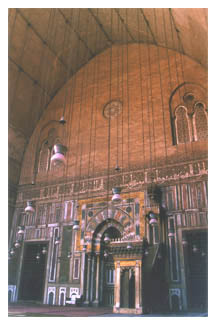
But once we adjusted, there was alot to take in. Here in
Cairo, we visited the famous Egyptian Musuem, crammed
full of precious antiquities. The museum is way too
small for the number of exhibits, and wonder upon
wonder are crammed into old wooden cases with few
descriptions. But thats part of the mystique and with
a good guidebook, we made our way through. The best
part of the musuem is the exhibit of Tutankhamun's
funerary treasures. His tomb was discovered
completely
intact in 1922 (Most of the famous pharoah's tombs
had
long been plundered) and the treasures for this
insignificant pharoah were so amazing as to wonder
what a great pharaoh like Ramses II would have been
buried with, had it not been stolen by ancient grave
diggers. We saw the famous solid gold King Tut
funerary mask and all his other treasures. Jewels and
gold galore. They also have a special room for the
royal mummies, and we look faced to face with a 5000
year old man.
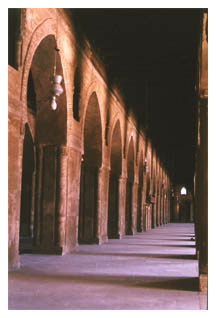 There
are also a number of serene mosques to visit. Usually built around
central open courtyards, these mosques are some of the finest examples
of modern Islamic architecture, with their repeating arches, soaring
ceilings and dramatically low hung lights. The atmosphere was somber and
reflective, and very inspirational. There
are also a number of serene mosques to visit. Usually built around
central open courtyards, these mosques are some of the finest examples
of modern Islamic architecture, with their repeating arches, soaring
ceilings and dramatically low hung lights. The atmosphere was somber and
reflective, and very inspirational.
In
Cairo, we spent a little extra and stayed at the fabulously decayed
Windsor Hotel. It reeked of a by-gone elegance complete with an antique
elevator and an elevator man to turn the hand crank. Our room was furnished with antiques
and beautiful mahagony wardrobe. And the bar was dim and full of strange
bedfellows. We sat before a wagon-wheel cocktail table and enjoyed
sidecars and breakfast was a stiff affair in the main dining room with
starched linens and silver cutlery. Highly recommended.
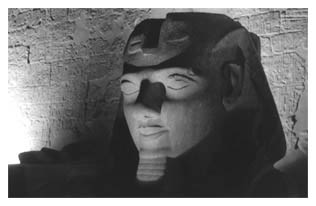
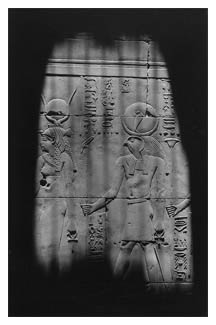 From Cairo, we
traveled to Luxor in southern Egypt
on
the famous Nile to visit a number of famous temples and ruins that
are remarkably preserved and clustered in such a small area. From Cairo, we
traveled to Luxor in southern Egypt
on
the famous Nile to visit a number of famous temples and ruins that
are remarkably preserved and clustered in such a small area.
There we also visited the Valley of the
Kings. After building the great pyramids (which we
have
not seen yet and our saving for our last day) pharaohs
realized their mistake of showing the world where
they
were buried. Not long after the pyramids were built,
they were plundered and the treasures carted off.
In ancient Egypt, they believed that the quality of
your afterlife depending on all the 'provisions' that
you were buried with, and robbery was too great a
chance to take. So they stopped building pyramids,
and
went to a very isolated valley and built their tombs
there in utmost secrecy. The workers were kept in
walled cities and killed after tomb completion so as
not to disclose the location. The tombs were built
deep underground and sealed hidden. The tombs were
built completely randomly, and one pharaoh had no
idea
where previous ones were buried.
So in the scorching heat of 122 degrees, we wandered
around the Valley of the Kings, visiting these
incredible tombs. Even with all these precautions,
many tombs were plundered, but what remains is still
remarkable. Wall carvings and paintings that are so
brilliant they look like they were built yesterday.
And all the time, Egyptologists, are still carrying
out
excavations. About a year ago, they found another
tomb
that they believe is for the many(200)sons of
Ramses II.
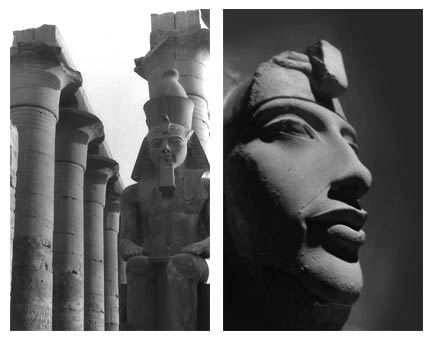
In the midst of our travels, we decided to take a
vacation, and booked a two day cruise aboard one of
the
many ships that ply the Nile. It was fantastic. For
two days, we lounged in splendor, watching the
fertile
Nile valley pass by, stopping occasionally to be taken to some beautiful
ruin along the way, lying in the sun, swimming in
the on-board pool, and only interrupted three times a
day to be fed. Highly recommended.
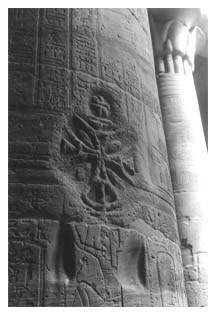 The package
came
with tours in Luxor where we met Mohammed, a great
enthusiastic guide whose coming to Chicago in
April to begin his masters in Egyptology at the
University of Chicago's Oriental Institute. He was
a great guide, you could tell he really
loved it, and he told us all his theories and current directions
in modern archeology. The package
came
with tours in Luxor where we met Mohammed, a great
enthusiastic guide whose coming to Chicago in
April to begin his masters in Egyptology at the
University of Chicago's Oriental Institute. He was
a great guide, you could tell he really
loved it, and he told us all his theories and current directions
in modern archeology.
We
learned about more 'recent' history of the area, including
much of the vandalism by Christian Crusaders intent on wiping away
traces of a 'pagan' society
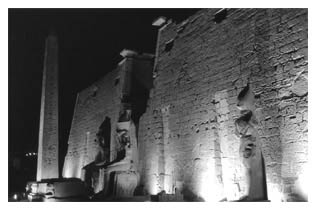
So, while Egypt cannot really be complete without the
pyramids, we will end it here and talk about the
pyramids next time (after we see them.)
Over and out
Ann and Doug
index | back
| next |
